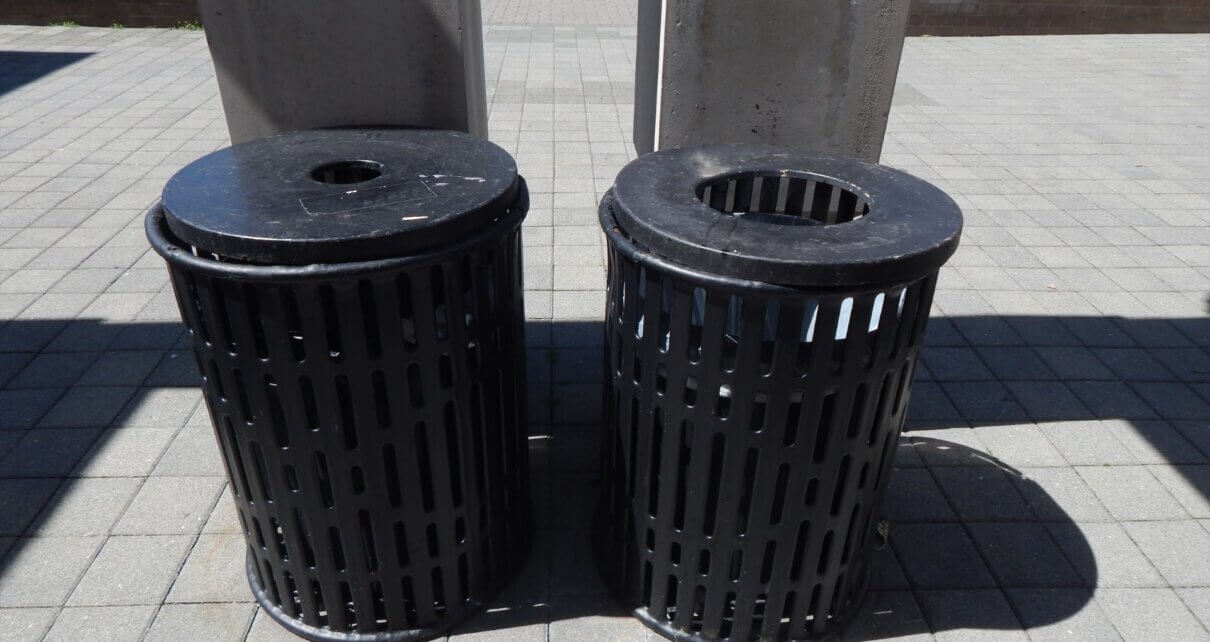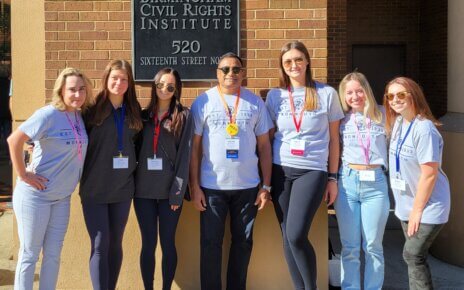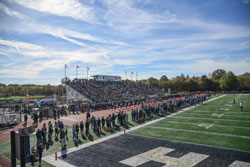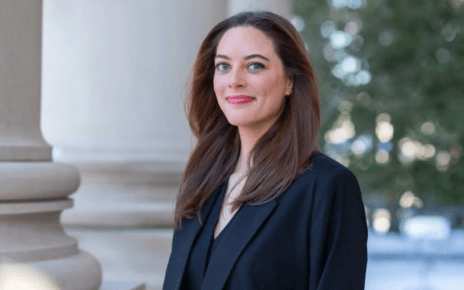“The Outlook” has recently received various concerns regarding the garbage and recycling processes on campus. Students had questions about the potential lack of separation of garbage and recycling on campus and wanted to find some answers.
On the Monmouth University website under “Waste and Management,” the school only details its recycling process, mentioning that they have utilized commingled recycling since 2011. The website states, “The University introduced single-stream recycling, a form of recycling that allows for comingled receptacles. It has helped increase our recycling rates by making it easier to recycle. Since then, the University has seen a dramatic increase in our recycling and waste diversion rates.”
John Tiedemann, M.S., Assistant Dean of the School of Science and the Director for the Marine and Environmental Biology and Policy Program (MEBP), explained what this process looks like. He said, “Commingled recycling means that items do not have to be sorted and collected separately. In other words, a variety of recyclable items can be mixed in a single bin by consumers. Once picked up by a waste management firm/hauler, they are transported by truck to a recovery/recycling facility and sorted there for distribution to appropriate outlets.”
Tiedemann continued, “The major advantage of a commingling system is that it makes recycling of items easier for consumers. For example, in my town we are allocated one large recycling can and all items can be put in this can without sorting. A potential disadvantage is contamination of one item by another, especially if food containers are not properly rinsed prior to recycling.”
Despite the clarity on Monmouth’s website about their recycling process, the school does not appear to have any information on how they operate the separation of waste and recycling if the two were to be combined. NJ.gov advises New Jersey residents not to mix anything that doesn’t qualify as a recyclable item in with a recycling can: “When you are not sure about whether a material should be put into your recycling bucket, it is recommended that you check with your local recycling program about your town or county’s recycling program requirements so that you do not unknowingly ‘contaminate’ your load of recyclable materials with unacceptable materials. Such contamination creates serious quality control issues and negatively affects the economics of recycling.”
The largest concern of those who voiced their opinions was the garbage bins placed outside of the dorm apartments. Inside the campus apartments, students receive garbage and recycling bins. Students then can separate their waste efficiently, but when they bring their garbage outside for takeout, they are faced with two, large bins in which they must place all of their bags. This system does not allow for the separation of garbage and recycling since these bins are not labeled for each type of waste. From here, the Monmouth facilities truck picks up the waste, throwing all the bags in the same truck with no separation, as explained by multiple student accounts.
What happens after the waste leaves campus is students’ main concern, in addition to how the commingled recycling process is effective if garbage is mixed in with the recycling. “The Outlook” reached out to Tim Orr, Executive Director for Campus Planning and Facilities Management, and Kara Sullivan, Director of Building Services and Facilities Administration, for clarification but did not receive a response. Students suspect that there is no separation occurring, and their concerns are rooted in their own experiences on campus.
Alexander Mykulyn, a senior political science student, voiced his opinions on the topic early on in the investigation. Mykulyn expressed his immediate concerns: “There seems to be a lot of questions (from both faculty and students) surrounding what happens to recyclable waste on campus.”
Mykulyn also shared some of his own experiences regarding this topic. He explained, “One night [my] sophomore year (2022), I was up late in the student center writing a paper. It was late when I watched facilities staff come through and empty both the garbage and the recycling into the same large collection bin. I thought it was a one-off, but over the years I’ve heard several other students and faculty voice the same kind of concerns. The thing that I think is particularly concerning is that, despite not recycling, the University still puts out bins clearly labeled recycling only. This is greenwashing on a massive, multi-year scale. If the University was going to stop offering legitimate and accessible recycling services for any reason, they should’ve made a clear statement about the decision and removed the bins labeled recycling. Monmouth University is a large institution capable of making a huge dent in the amount that we divert away from landfills. We should capitalize on that opportunity…What needs to happen now is a widespread reboot due to the necessity of public cooperation in recycling. Along with changing operations to recycle the contents of bins labeled recycling, the University needs to make a clear statement that the material will be recycled to get students and faculty back on board and reduce levels of contamination in the recycling.”
Mykulyn’s story echoed the concerns of students involved in the MEBP program such as Einat Shayer, a senior MEBP student. Shayer said, “I don’t think they separate garbage and recycling because I can’t find anywhere on their website saying they do. I’ve also seen maintenance workers put both recycling and regular trash in the same bin before. This is a problem because a lot of the plastic on campus can be recycled and reused, but the school is just missing the opportunity to do that so it’s just going to end up in our oceans and landfills.”
Jasmine Barzin, senior MEBP student and past student ambassador of the Sustainability Advisory Council, also commented on this concern. “I definitely feel as if there is a lack of separation between recycling and waste disposal on campus,” she began, “in addition to an overall lack of sustainable practices on campus. This is an issue that the sustainability council has attempted to address, but there wasn’t much success. Some goals of the council were: to bring posters/visual imagery to promote what goes where to educate people, distinguish the recycling bins from the trash bins to avoid confusion (since they look alike), have ‘no litter’ signs, and potentially create some sort of job that would clean the recyclable material to be reused.”
Barzin continued, “I’m not sure about now, but these goals were not addressed when I was part of the council. The job could be a neat idea because of the fact that even ‘recyclable’ things cannot be recycled if contaminated, which causes a whole other spiral because then it goes back into the waste. I agree that more action should be taken to become a more sustainable campus and to make more of an effort to recycle. If we don’t separate it, our waste footprint would just be huge. Plus, if we do separate it, it could be something the school could ‘brag’ about that they are working on sustainable practices around campus.”
Marie Mauro, senior MEBP student and last year’s president of the MEBP Club, concurred, “I do not believe that recycling is separated from garbage collection here on campus. As a resident, all of our trash and recycling go into the same place. This system encourages students to not even keep a recycling bin and to just have two normal garbage bins, despite the fact that we are provided with both types of bins. It is a problem that garbage and recycling are not separated because it creates habits with the residents to possibly not recycle in the future. It is crucial that we recycle to try and limit the amount of waste that ends up in landfills. In many cases, our landfills are outdated and at capacity, which is why recycling can have an impact.”
On the University website under the Sustainability Advisory Council webpage, Monmouth was acknowledged for their commitment to sustainable recycling practices. The site says, “The university was recognized as an institutional leader for its broad-based program that resulted in recycling 46% of the waste generated on campus in 2018. The program includes initiatives to recycle glass, plastic, metal, aluminum, used light bulbs, batteries, toner cartridges, and more.” Additionally, Monmouth has been recognized for being “the first private institution of higher education in New Jersey to enter into a Memorandum of Understanding with the Environmental Protection Agency,” according to the University website under “Green Campus.”
Kristen Frawley, a junior social work major, expressed her reaction to these campus conjectures: “If these speculations are true, I would be deeply saddened to hear this about my own University. It would make me question the school’s integrity regarding our claimed green campus. I hope the University can clear these questions up and be a good model for sustainability.”




